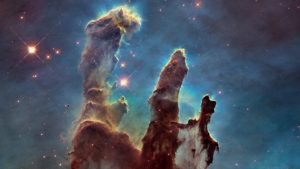The poet of Psalm 8 stared into the night sky and was properly dazzled at what he saw. But to put it mildly, what he did not see was a lot! Had this psalmist been able to spend a scant ten minutes looking through a telescope, he would doubtless have fainted in wonderment. Ancient astronomers were quite skilled at mapping out the night sky, even to the point of being able to predict star movements. What puzzled these early scientists, however, was a handful of stars that refused to behave.
There were about a half-dozen stars that did not march in lock-step with the others, but instead meandered all over the place. The Greeks finally called these mystery stars “wanderers,” believing them to be errant stars that had somehow lost their way in the universe. The Greek word for “wandering” is planeo, from which we derive the English word “planet.” Because of course we now know that the reason those wandering stars behaved so funny is that they are not stars at all but other worlds all their own.
We’ve now seen up-close pictures of Venus and Jupiter, of Saturn and Mars. And their beauty is stunning. But the poet of Psalm 8 didn’t know any of that. He saw pin-pricks of light twinkling in the night sky and was overjoyed. How much more cause for joy we have! It is estimated that there are at least 10 billion galaxies in the universe, with each galaxy containing perhaps 100 billion stars. In other words, not only are the stars we see in the night sky far away, they are a mere fraction of what’s really out there.
Now you can take all of that mind-numbing data and do with it what you will. Some years back Time magazine published some of the Hubble telescope’s magnificent photos of luminous, gorgeous, enormous pillars of clouds and gas. A few weeks later someone wrote a letter to the editor stating that these photos should finally put an end to the religious idea that humanity amounts to anything. Not only are we clearly not the center of the universe, this person wrote, we don’t even register.

Even Psalm 8 admits that the wonders of the universe are humbling. Of course, you don’t need to go into space to see such wonders. Scoop up a teaspoon-full of topsoil from the forest floor and, with the help of a microscope, you could probably find upwards of 1,400 beetles and springtails, not to mention about two billion fungi, algae, and protozoa. Or look at the birds of the air. Arctic Terns fly a 10,000 mile round trip each year from their winter home in the Antarctic to their summer home in Asia. Meanwhile the Northern Fulmar spends its entire life out on the ocean, having a wondrous ability to drink seawater. The Fulmar has an entire desalinization factory in its beak, removing the salt from the water, excreting it through a tube on the top of its beak, and then drinking the now-fresh water!
The universe is clotted with wonder. On both the macro and micro levels, in both human and non-human creatures, the cosmos teems with life, with complexity, with music, and with movement. It is all finally every bit as humbling as Psalm 8 claims.
But Psalm 8 is not designed to make us feel like nothing. Instead, in a remarkably brief compass of only 70 Hebrew words, Psalm 8 directs us how to think about God, creation, and their relation. In other words, this psalm could be properly seen as the touchstone for human life in the cosmos.
Psalm 8 is the first psalm of praise in the Book of Psalms. It is also the only one of the 150 psalms that is a direct address to God throughout the entire poem. And how very curious and instructive it is that the first psalm of praise in the Bible is about creation. As recently as fifty to seventy years ago, biblical scholars were convinced that the ancient Israelites did not much care about creation. Many scholars thought that Israel was far more interested in redemption–the covenant with Abraham, the exodus from Egypt, and the like.
Psalm 8 is one of a bevy of texts that proves those sentiments wrong. Creation mattered enormously to the Israelites. The cosmos is the handiwork of God, is the target of redemption, so much so that the Israelites could not even conceive of salvation apart from the promise of a good land flowing with milk and honey. Throughout the Old Testament, as Larry Rasmussen once pointed out, it’s difficult to distinguish salvation from good highlands agriculture. God’s plans, purposes, and promises are again and again tied together with things like soil and fruit, flocks and meadows, wine and wheat. Indeed, as Rasmussen said, perhaps the ultimate reason why we will one day beat swords into plowshares–or maybe we’d have to say beat armored Howitzer tanks into John Deere garden tractors–is not only so that warfare will cease but also so that we can return to our proper vocation of earth-keeping, of tending and tilling the garden of God’s good creation.
Creation matters because, as Psalm 8 makes clear, God himself loves it. These days many Christians are fearful of pantheism that declares the earth to be a divine goddess. Unhappily, however, our desire to put daylight between ourselves and such heresies has caused us also steer clear of biblical ways by which to describe the cosmos.
In Psalm 8 the psalmist has no problem saying that the physical world just is the glory of God. The stars, sun, moon, flocks, beasts, birds, and the rest declare the glory of God. This psalm begins and ends with a declaration that God’s name is visible in all the earth. What that means is that it is proper to point to a star and say, “I see God there!” It is by no means pantheistic to see a field of wildflowers and then connect it to God. When an art expert comes across a painting and declares, “That’s Picasso!” he does not mean that the artist and that oil-streaked canvas are the same thing. Instead it means that the artist’s handiwork is so clearly on display that you can see the artist in his or her work.
So also with Psalm 8: God’s presence in the cosmos runs the gamut from the gossamer threads of the moth’s wings to globular clusters of stars in space. God made it all, remains active in its preservation, remains vitally interested in its flourishing. Psalm 8 authorizes us to look for and to find God in the beauties of the galaxy. Whether you’re peering into a telescope or a microscope, watching a white-tail deer leap through a meadow or noticing the wondrous design of your own foot, what you’re seeing is nothing less than the glory of God.
All of that, however, is just one-half of Psalm 8’s larger purpose. The other half addresses what is sometimes called “the humanity question.” Who are we? How do we fit? Again, without even knowing how vast space really is, the psalmist saw the moon and stars and felt like nothing by comparison. We have still more cause to feel that way today, and many thinkers do now proclaim that humanity is nothing–or at least nothing special.
The Bible disagrees rather heartily. If there is anything more marvelous than the sheer scale and splendor of the universe, it is the revelation that in all of that vastness, we really do matter. We have been endowed with the image of God, or as Psalm 8 puts it, with a crown of glory and honor. Because of this gift so graciously doled out by God, we are put in charge of this cosmos to tend and keep and rule it on God’s behalf.
It goes without saying that non-Christians don’t buy that the same way they don’t buy much else that is in the Bible. Still, if you pay attention, you can detect evidence of this image. After all, it is precisely our God-likeness that allows us to feel small in the first place. We have an ability which, so far as we can tell, no other critter on the planet has: namely, the ability to note, study, appreciate, catalog, photograph, record, and celebrate otherness. Only we can do that because we are chips off the divine block!
Psalm 8 is assigned for Trinity Sunday and as such we can be reminded of another creation text in the New Testament in Colossians 1. There it is clear that the Son of God—known in his incarnate form as Jesus—was not only the active agent in creating the cosmos but that it was all in some way created FOR him too. This also might point to that divine delight the Triune God is always depicted as displaying vis-à-vis creation. God also delights in watching the never-ending array of fish, birds, wildlife, and so on that populate our world. God notices us. God notices birds.
And the glory of God is revealed in all of it!
Illustration Idea

The midnight parrotfish that swim around coral reefs don’t take note of the other creatures they see, even when those other creatures are as different as human beings. When my wife and I snorkel, we are attentive to details and keep careful track of all the many different fish we see. Upon returning to the shore, we consult our Caribbean Reef Fish Identification book and carefully check off what we’ve seen on our life-list of fish species. But the fish don’t do that. They don’t keep track of one another nor, upon seeing us visiting them on the reef, do they check us off on a list somewhere. Fish don’t say to themselves, “Oh, there’s a blonde Caucasian human female. Great! So far I’ve only seen brunettes!” No, only human beings seem capable of noticing and enjoying the variety of God’s creation.
Sometime back the folks at Coca-Cola made a TV commercial showing polar bears sitting around oohing and ahhing over a display of the northern lights. But, of course, real polar bears don’t pause to observe that colorful spectacle. We do.
As Simone Weil once noted, as curious as anything else in the Bible’s account of creation is the revelation that God is not God-centered. God has the ability to transcend himself. If, as we Christians believe, God is himself glory defined, if God has within the resources of his own self inestimable power as he dwells in the splendor of light inaccessible, then isn’t it particularly marvelous to know that even with all the glory he has within his own self, God still is able to get out of himself in order to gaze at and enjoy the spouting of whales?! God gets out of himself to get into others. Our ability to do that is God’s gift–it’s a major part of the glory and honor with which God has crowned us. O Lord, our Lord, how majestic is your name in all the earth!
Sermon Commentary for Sunday, June 12, 2022
Psalm 8 Commentary